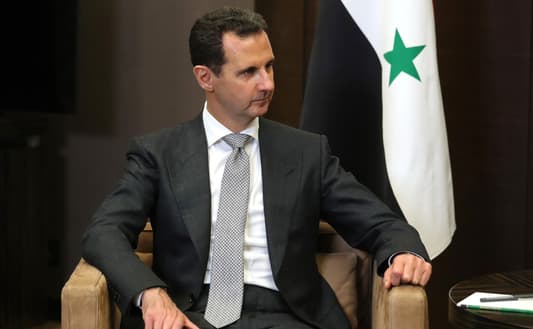Syrian President Bashar al-Assad has arrived in the east Chinese city of Hangzhou, kicking off his first visit to the Asian nation since 2004 as he makes further strides to end more than a decade of diplomatic isolation amid Western sanctions.
Assad arrived aboard an Air China plane amid heavy fog, which Chinese state media said "added to the atmosphere of mystery" in a nod to the fact the Syrian leader has seldom been seen outside his country since the start of a civil war that has claimed over half a million lives.
He is due to attend the opening ceremony of the Asian Games along with more than a dozen foreign dignitaries, before leading a delegation for a series of meetings in several Chinese cities, including a summit with President Xi Jinping.
Being seen alongside China's president at a regional gathering should add further legitimacy to Syria's campaign to slowly return to the world stage, which has seen the country join China's Belt and Road Initiative in 2022 and be readmitted to the 22-nation strong Arab League in May.
Assad last visited China in 2004 to meet then-President Hu Jintao. It was the first visit by a Syrian head of state to China since the countries established diplomatic ties in 1956.
China - like Syria's main allies Russia and Iran - maintained those ties even as other countries isolated Assad over his brutal crackdown of anti-government demonstrations that erupted in 2011.
Assad faces sanctions imposed by the United States, Europe, Australia, Canada and Switzerland, but efforts to apply multilateral sanctions against his regime having failed to garner unanimous support at the United Nations Security Council, which China and Russia are members of.
China has on at least eight occasions vetoed U.N. motions condemning Assad's government and aimed at bringing the decade-old multisided conflict that has sucked in neighbours and world powers to an end. Unlike Iran and Russia, China has not directly supported the regime's efforts to regain control of the country.
U.N.-commissioned investigators have said Russian bombing and Iran-backed militias are responsible for the bulk of the more than 200,000 civilian deaths recorded since the war began, which has triggered refugee and drug smuggling crises that the Arab League is pushing Damascus to resolve.
Syria has strategic importance for China given it sits between Iraq, where around 10% of China's oil comes from, Turkey, which marks the end of economic corridors stretching across Asia into Europe, and Jordan, which often mediates disputes in the region.










TWEET YOUR COMMENT